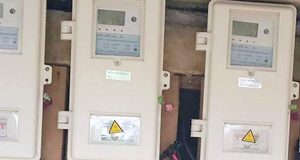……20,000 communities needs electricity – REA…….
The Rural Electrification Agency (REA) has successfully inaugurated a 550kWp solar hybrid mini-grid project in the Bakin Ciyawa and Kwande communities, located in Qua’an Pan Local Government Area of Plateau State. The initiative is set to provide electricity to over 3,500 households and boost local businesses in the area.
Speaking at the inauguration ceremony on Monday, REA Managing Director Abba Aliyu emphasized the importance of this project in addressing the electricity deficit in rural communities. Aliyu noted that the country still faces a significant challenge in providing electricity to remote areas, with an estimated 20,000 communities nationwide lacking access to power.
“The completion of this 550kWp interconnected mini-grid is a game-changer for both Bakin Ciyawa and Kwande,” said Aliyu, who was represented at the event by Doris Ugoh, the REA’s Executive Director. “Bakin Ciyawa now has a 390kWp system, while Kwande benefits from a 160kWp system. Together, these systems will provide clean and sustainable electricity to over 3,500 households, as well as support countless micro, small, and medium enterprises.”
Aliyu further explained that the solar mini-grid project was funded under the EU and German government’s €11 million grant to provide electricity to rural communities across Nigeria. “More than 60% of this funding has been generously donated by the European Union and the German government,” he said, highlighting the international collaboration aimed at enhancing the country’s energy access.
The REA Managing Director also provided insight into the government’s broader efforts to energize rural areas. “Under the current administration, we are working to energize a total of 3,700 communities. This will be achieved in phases, with 100 communities being electrified in each state. By the end of the program, 370MW of clean energy will be introduced into the Nigerian energy space.”
Aliyu outlined the first phase of the project, which aims to electrify 925 communities nationwide by installing 92MW of clean energy. “This is part of our strategy to gradually transform Nigeria’s energy landscape, especially for rural and underserved communities,” he added.
Environmental sustainability was another key focus of Aliyu’s speech. He noted the significant environmental benefits of the solar mini-grids, stating that they would drastically reduce carbon emissions by replacing diesel generators and kerosene lamps traditionally used for lighting. “The 550kWp system installed in Bakin Ciyawa and Kwande will cut down an estimated 600 tons of CO2 emissions annually,” Aliyu explained. “This is the equivalent of removing around 130 cars from the road or planting 15,000 trees each year, contributing significantly to mitigating climate change.”
Aliyu also highlighted the ongoing challenges in providing electricity to the country’s rural areas. “Over 20,000 communities nationwide remain without power. However, we are determined to extend this project to neighboring communities as well,” he assured.
The solar mini-grid initiative is part of the Interconnected Mini-Grid Accelerated Scheme, a program designed to speed up the development of Nigeria’s mini-grid market and provide clean energy to underserved communities. “Through this scheme, we aim to reach 125,000 beneficiaries across Nigeria, including all six geopolitical regions, with the support of our international development partners, such as the German Cooperation, the European Union, and GIZ,” said Aliyu.
Plateau State Governor Caleb Mutfwang, represented by the Commissioner for Tourism, Mr. Cornelius Doeyok, also lauded the project’s significance for the state. “Last year, we signed an MoU with the REA to energize our rural communities, and the N1.2 billion counterpart funding we contributed will help light up our primary health centers,” Mutfwang said.
The governor highlighted how electricity would facilitate preventive healthcare in rural areas, ensuring that medicines are properly stored and not spoiled due to lack of refrigeration.
The German Ambassador to Nigeria, Dr. Karin Jansin, also expressed her support for the project. “This project is of great importance to Germany and to Plateau State,” Jansin said. “Over 20,000 people stand to benefit directly from this initiative, and the project will stimulate job creation, especially in agriculture, industry, and other sectors.”
The benefits of the solar mini-grid project were further echoed by Mr. Hubert Isa, a representative of both Bakin Ciyawa and Kwande communities, who expressed his community’s excitement about the new electricity supply. “This project represents a significant step forward for our communities,” Isa said. “It proves that the federal government has not forgotten us. The promise of providing electricity to underserved communities is now becoming a reality. This project gives us hope and signifies that development is coming to our doors.”
The 550kWp solar hybrid mini-grid project in Bakin Ciyawa and Kwande marks a key milestone in the Nigerian government’s efforts to provide clean and sustainable energy to rural areas, and it is hoped that similar projects will soon light up other remote parts of the country, contributing to broader economic development and environmental sustainability.
 Financial Energy Review
Financial Energy Review





